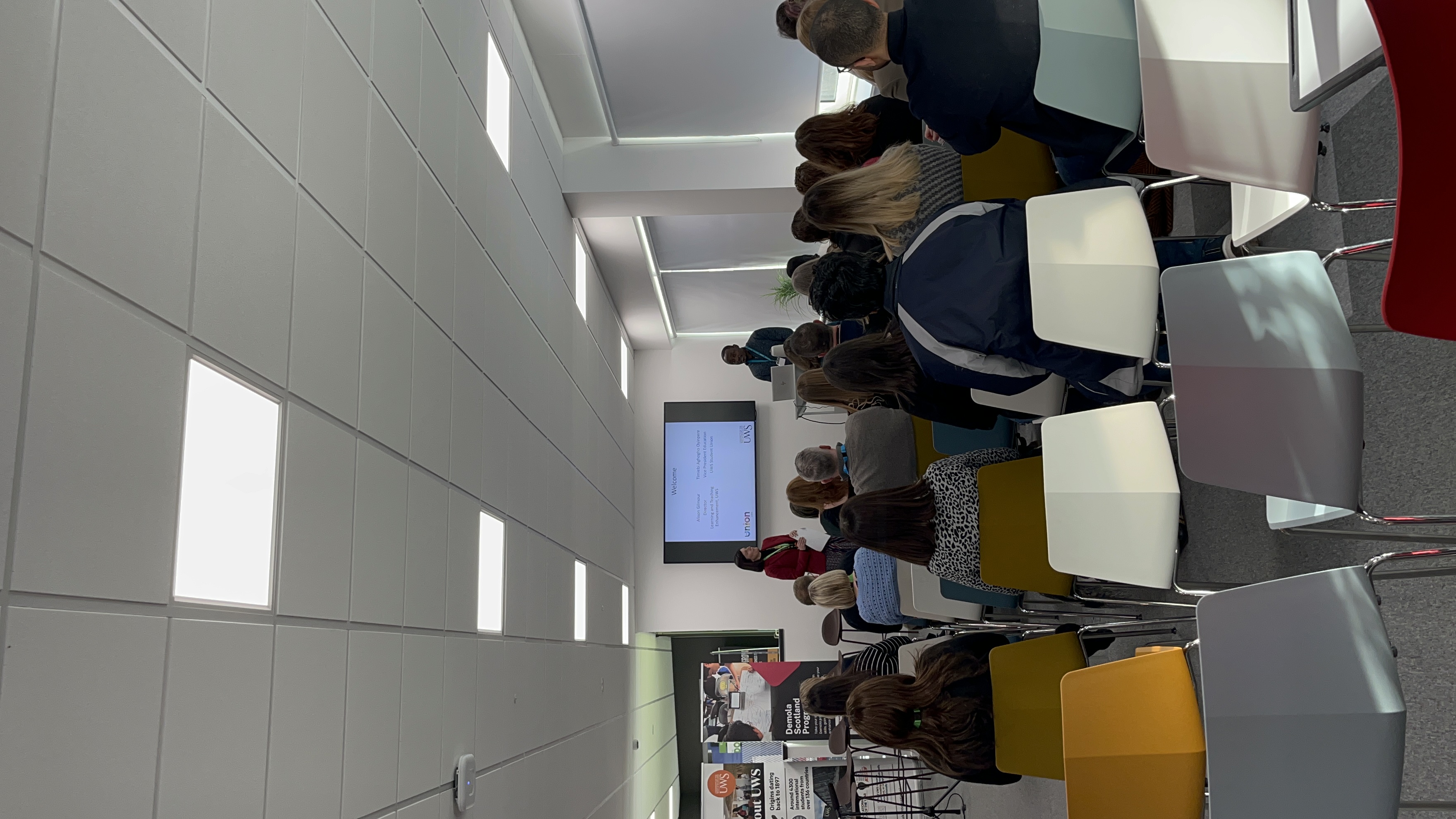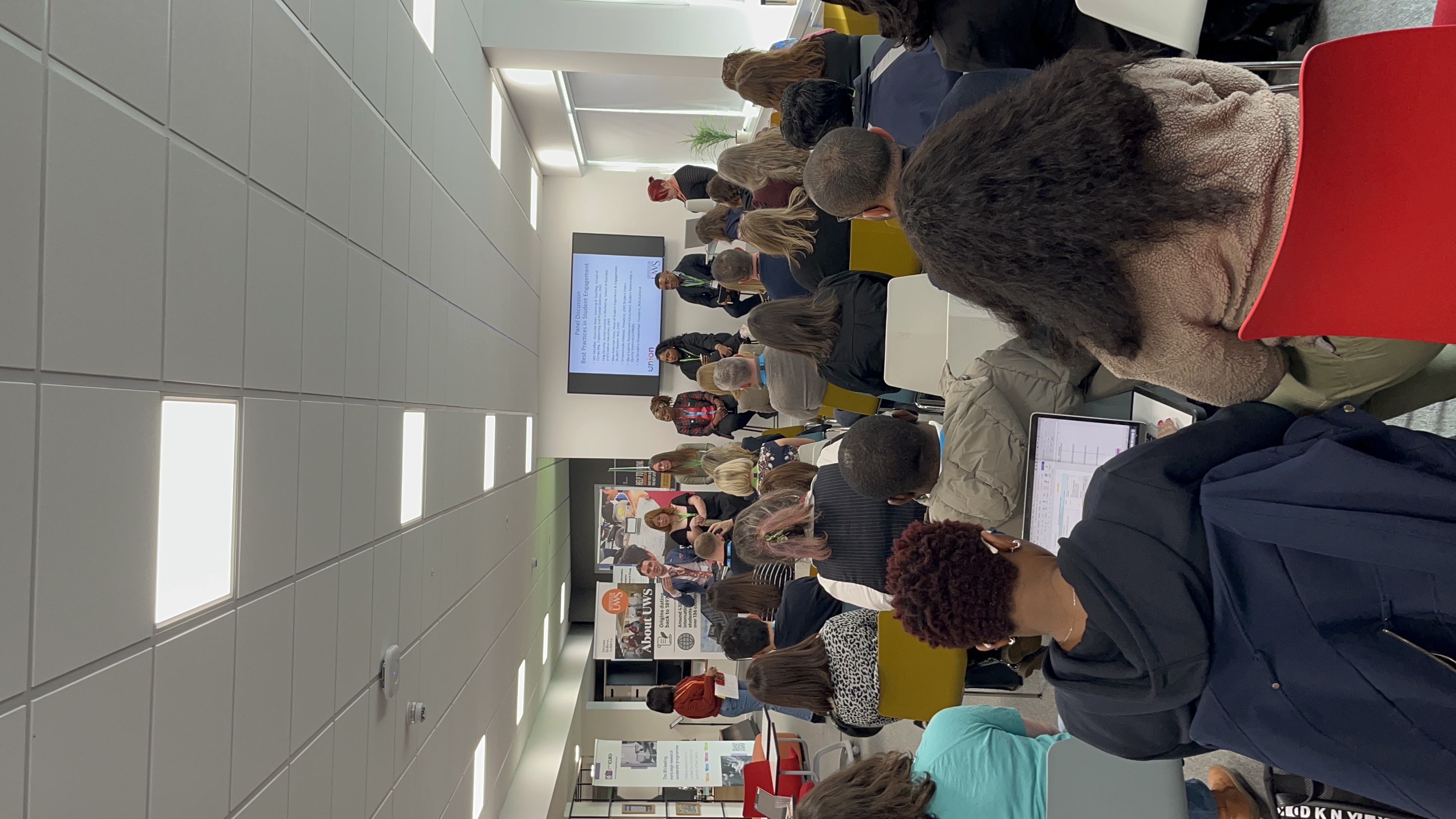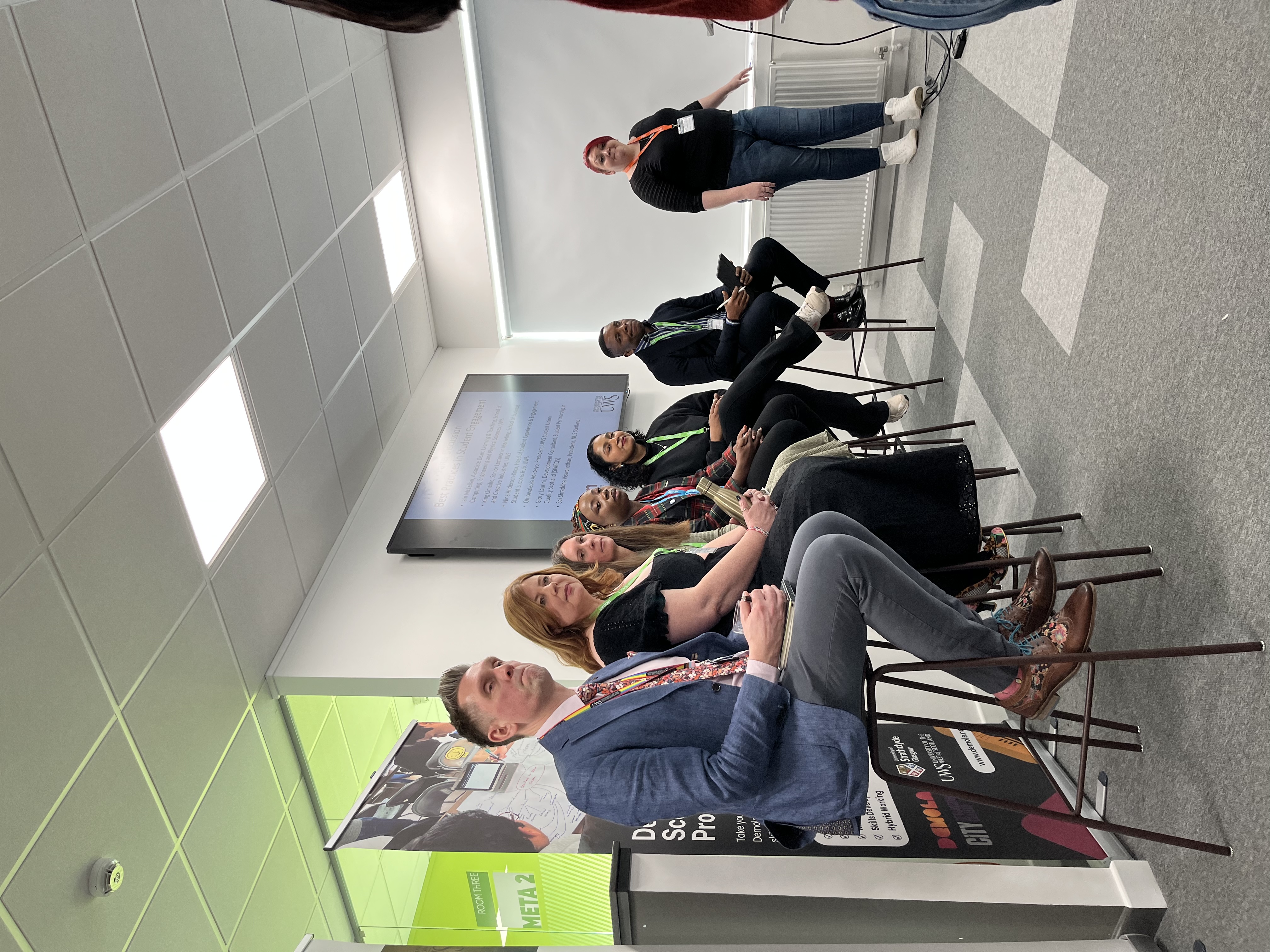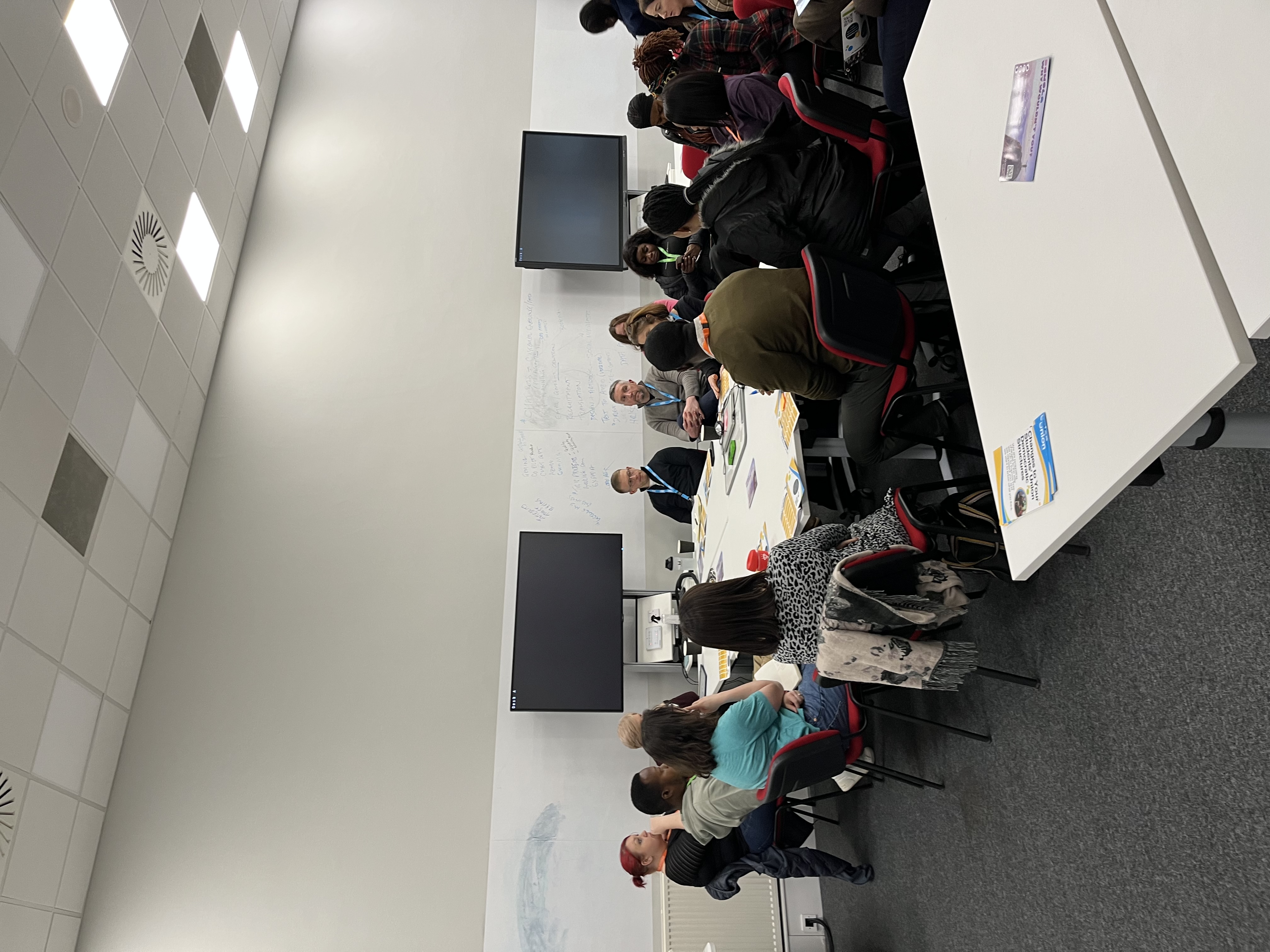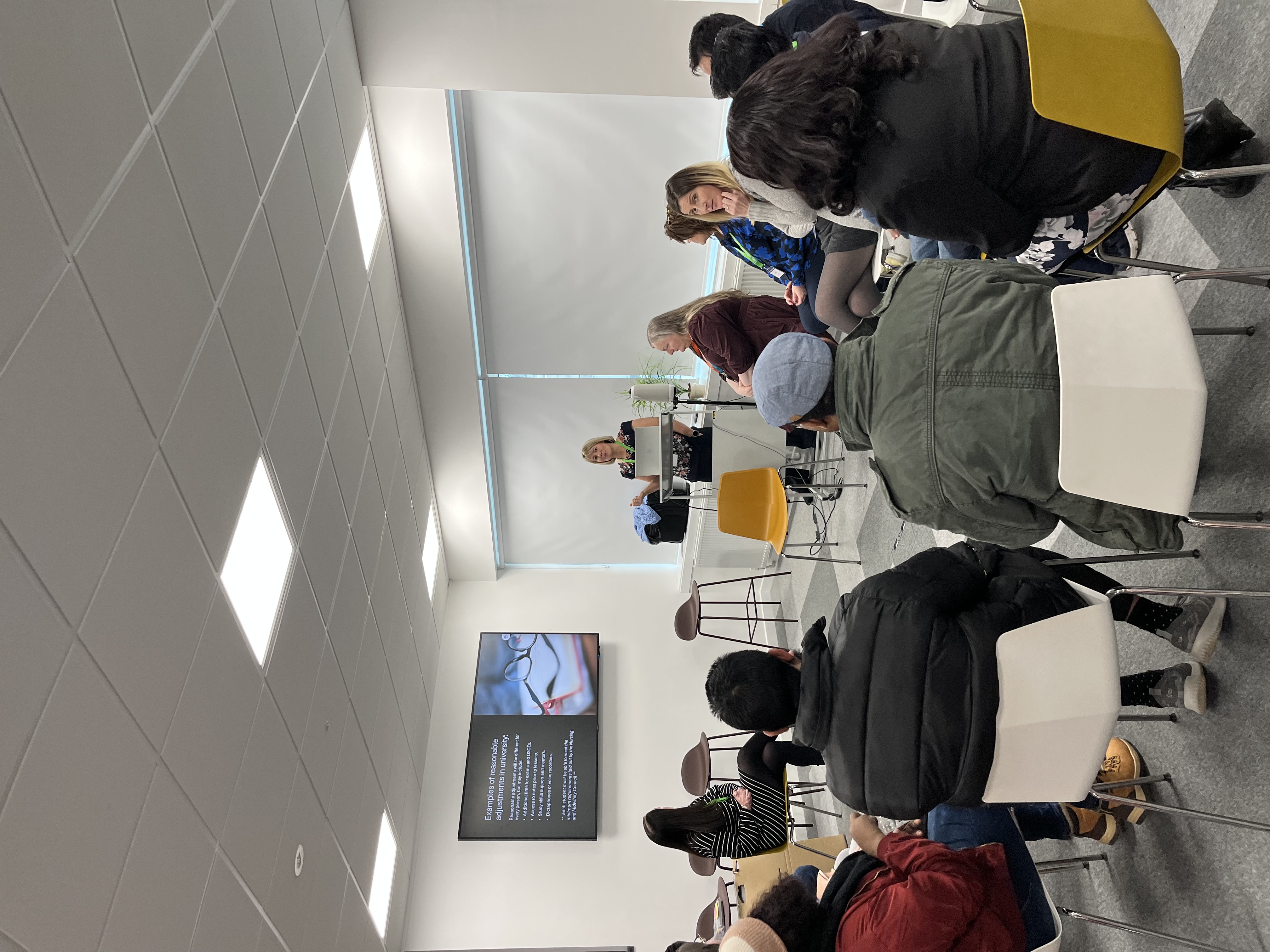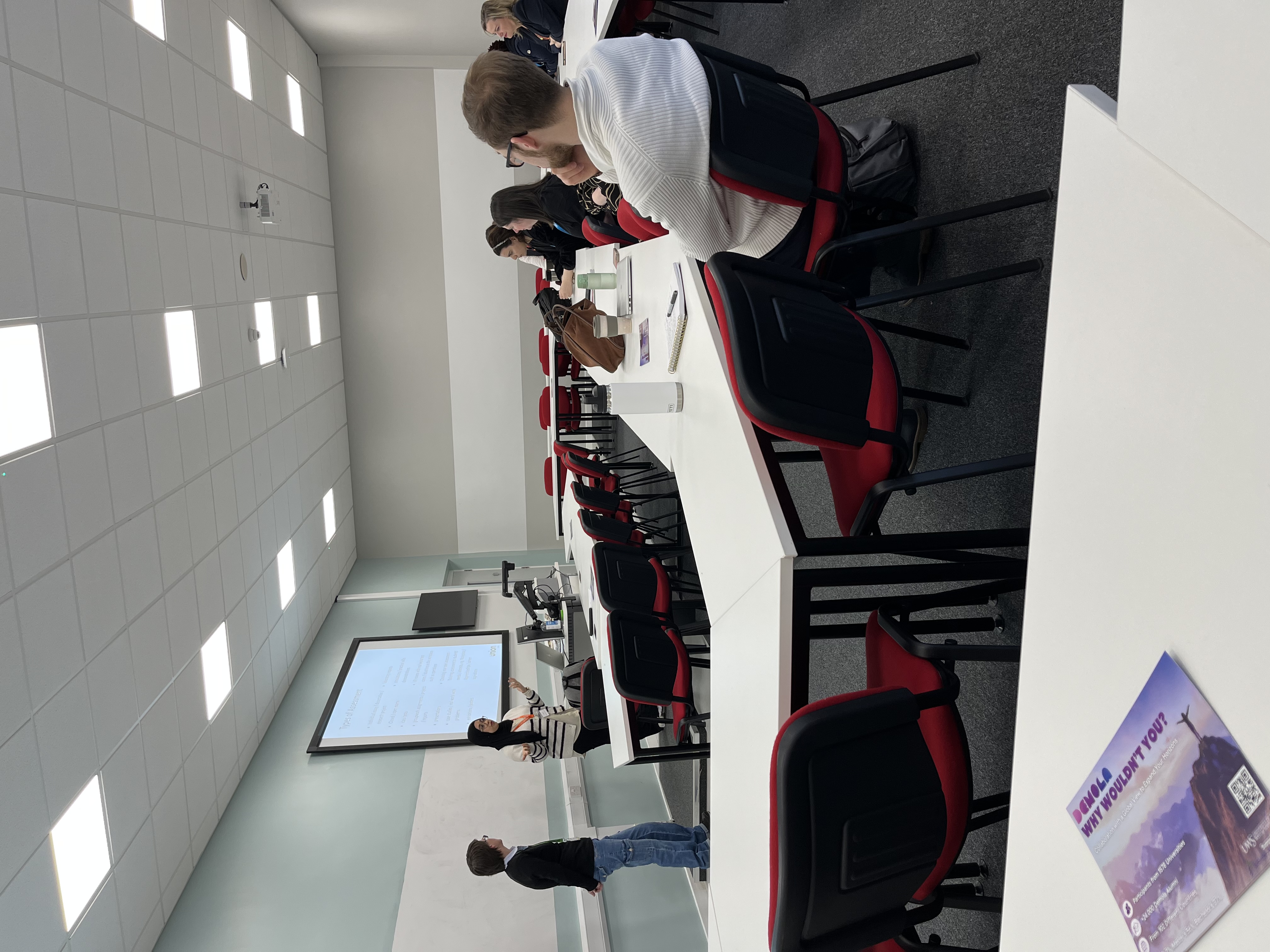The Student Partnership Conference 2025 was the first of its kind held at UWS, the conference brought together students and staff from across the institution to discuss and strengthen partnership activities.
Conference aims:
This was the first ever Student Partnership Conference held at UWS, the Conference aimed to directly support the Tertiary Quality Enhancement Framework's (TQEF) core principle of "Students at the heart" of educational enhancement. The aims of the Conference were to:
- Develop staff and student understanding of partnership approaches.
- Demonstrate that UWS is well-positioned to align with Tertiary Quality Enhancement Framework requirements (TQEF)
- Build stronger staff-student relationships
- Share best practices across schools and departments
- Ensure student voice is captured "every student, every place, every level" as specified in TQEF
You can view the full programme here: Student Partnership Conference 2025 - Programme
Welcome address
Delegates were welcomed by Alison Gilmour, Director, Learning and Teaching Enhancement, and Timiebi Aghogho Oyinpere, Vice President Education, UWS Student Union.
Alison and Timiebi encouraged delegates to use the questions below as prompts through the day for reflection and active contribution to the ongoing development of student engagement at UWS.
• How can individuals contribute to genuine dialogue in addressing challenges and solutions in partnership?
• How can a strong student voice be supported in shaping teaching and curriculum design?
• How can participation in an effective student representative system be improved?
Reflections on Student Partnership
Delegates heard from Emily Mcintosh, Director of Student Success, on the work being undertaken to support Community and Belonging.
Emily highlighted student partnership is an evolving journey, emphasising the importance of dialogue, collaboration, and co-creation between students and staff, noting students bring valuable lived experiences and expertise that shape the learning environment. Emily describes that true partnership fosters belonging, inclusivity, and empowerment, and recognises that student success is not a ‘one-size-fits-all’ but depends on diverse needs and identities. Challenges such as financial barriers, perceptions of exclusivity of events, and the need for more responsive feedback mechanisms were also explored.
Emily explains the UWS Being, Becoming, Belonging initiative was a key effort to enhance student engagement, emphasising the importance of relationship-building, built on daily interactions, leading to stronger engagement, representation, and community within UWS., Emily also focused on the importance of initiatives such as peer learning, academic societies, and mentorship in supporting student engagement and partnership, encouraging students to actively participate in these to shape their university experience.
You can view Emily's presentation here: Reflections on Student Partnership
Student Engagement and Partnership in TQEF and TQER
Delegates heard from Helen Butcher, Head of Quality Enhancement and Standards Team, on the new Tertiary Quality Enhancement Framework (TQEF) and the upcoming Tertiary Quality Enhancement Review (TQER) which UWS will participate with in October 2025.
Helen provided an overview of the new Tertiary Quality Enhancement Framework (TQEF) and its role in ensuring high-quality learning, student success, and institutional accountability. Helen emphasised Scotland’s student-centered approach to quality assurance noting the Tertiary Quality Enhancement Review (TQER) will be a key assessment for UWS with students playing a central role in shaping outcomes.
Helen also highlighted the importance of student engagement in decision-making, ensuring feedback loops are closed, and exploring ways to integrate informal student voices into formal quality processes. She encouraged discussion on capturing informal feedback, recognising its potential to enhance structured frameworks and institutional improvements.
You can view Helen's presentation here: Student Engagement and Partnership in TQEF
Enterprise Team: Supporting Student Success
Delegates heard from Fraser Maitland, Enterprise Manager on the work and activities of the Enterprise Team and how they support students to succeed in their chosen fields, helping them fulfil their personal and professional ambitions.
Fraser discussed the role of enterprise in fostering co-creation, collaboration, and innovation among students, staff, and businesses, emphasising the importance of embracing failure as a learning tool and creating spaces for experimentation and entrepreneurial thinking.
Fraser outlined the current initiatives, including UWS Ignite and the Demola Programme, aim to support students in idea development, problem-solving, and engaging with global industry challenges. Fraser also highlighted efforts to connect students with businesses, alumni, and funding opportunities, such as the Freelance Academy and Young Enterprise Scotland partnerships. Fraser also stressed the need for adaptability, engagement, and student-led innovation to drive meaningful change at UWS.
You can view Frasers presentation here: Enterprise Team
Panel Discussion
Guest experts:
- Iain McLellan, Associate Dean: Learning & Teaching, School of Computing, Engineering and Physical Sciences, UWS
- King Omeihe, Senior Lecturer in Marketing, School of Business and Creative Industries, UWS
- Nina Anderson-Knox, Head of Student Experience & Engagement, Student Success Hub, UWS
- Omowaleola Adebayo, President, UWS Student Union
- Glory Laurini, Development Consultant, Student Partnership in Quality Scotland (SPARQS)
- Sai Shraddha Viswanathan, President, NUS Scotland
Co-Chaired by:
- Gemma Murrell, Union Chair, and Student Rep Society President
- Edith Okailey Okaitey, PhD student, School of Education and Social Science
Summary
The Panel Discussion highlighted engagement goes beyond academics and the classroom to encompass extracurricular activities, social interactions, and wider institutional involvement, dscussion emphasised that effective engagement should empower students, foster a sense of belonging, and contribute to their personal and professional development. The discussion highlighted the significance of trust, cultural competence, and institutional support in ensuring that all students, including international and widening access students, feel valued and included. Panel guests also considered the evolving nature of student expectations, with many seeking more dynamic, real-world learning experiences.
Challenges to student engagement were also explored, particularly the impact of the pandemic, digital transformation, and the changing student demographics with many students struggling with balancing academic commitments, part-time work, and personal responsibilities, which can often lead to disengagement. There was also acknowledgement there may be a gap in communication between institutions and students, with traditional engagement methods such as class representative systems seeing low participation. The panel noted bureaucratic hurdles, digital poverty, and a lack of awareness about engagement opportunities further complicate the issues.
Overall there was agreement that student engagement is everyone’s responsibility and there is a need for students to feel safe, valued, and part of the community to help them to engage. Simple actions like saying hello, showing interest in students' well-being, and creating inclusive spaces can make a big difference.
You can watch the full panel discussion by clicking here
Workshops:
Neuro Inclusive Education Environment
The workshop brought students and staff together to create awareness and further understanding of how we can best support students throughout their university career and to continue the cultivation of a neuro inclusive educational environment within the Mental Health and Adult nursing programmes. The workshop focused on ensuring that the voice of the student is heard and that any future neurodiversity awareness sessions are meaningful and align with needs and preferences of the neuro divergent community.
Workshop Facilitators:
Kath Limond (Lecturer, Health and Life Science)
Lauren Gillies-Walker (Lecturer, Health and Life Science)
Jackie Hyslop (Student, Health and Life Science)
Workshop Overview:
The workshop started by providing an overview of the Neurodiversity Awareness online session that was conducted with Nursing students at year 1 induction in September 2024. Facilitators shared the slides from this session and then explained that from the workshop we wanted delegates to consider the following:
- What supports do neuro-divergent students need when starting university?
- What additional information would be beneficial to neurodivergent students?
Main themes from the discussions:
Flexible deadlines/additional time for exams:
- Students with and without support plans should be able to access additional timeframes for the completion of coursework/exams.
24-hour access to computer labs:
- Students raised the possibility about the availability of 24-hour access to the library and computer labs. This would benefit those students who may have different circadian rhythms due to a specific condition, those students who preferred studying in silence, but also students without a disability who work best at night times.
Staff training:
- Neurodivergent students should be provided with access to personal tutors who have additional knowledge and understanding of neurodiversity.
- Inclusive teaching styles, lecture capture, videos, electronic lecture notes available prior to the classes.
- More cultural awareness about neurodiversity (particularly for those teaching international students).
Neurodiverse societies:
- Students felt that this may be beneficial to the neurodivergent community to have a specific society for students to share hints and tips about studying and managing university, as well as providing social links.
- To provide networking and advocacy support spaces.
Resources:
- Providing maps/photographs of university and specific spaces for neurodivergent students to be able to look at and understand the space ahead of attending university.
- Providing photographs of lecturers at the beginning of new modules to reduce anxiety.
- Provide transition sessions in the summer months for new students to attend so that they can access campus and learn to navigate the spaces ahead of the busy induction weeks.
Partnership in Assessment: Conversation Starter
This workshop was designed to provide a ‘conversation starter’ for encouraging students and staff to work in partnership in assessment design and delivery. You can view the workshop slides here: Partnership in Assessment workshop slides.pdf
Workshop Facilitators:
Claire Lumsden (Representation and Training Co-ordinator)
Amina Manal Zidi (PhD student, School of Education and Social Science)
Workshop overview:
During the session delegates explored what we mean by Assessment and explored the different methods (i.e. Summative / Formative) as well as types of assessment available (i.e. exams, written essays, presentations etc.). There was discussion around what an ‘Open Exam’ was and delegates discussed the idea of the ‘flipped classroom’, exploring how this can enhance students learning and critical thinking.
Delegates used the Participation Matrix to identify their own ‘level of participation’ during their current or previous studies, most delegates were ‘informed’ of their assessment method meaning they had very little to no say in how the assessment was designed.
We then discussed case study examples of partnership in assessment activities to which delegates considered if they would have engaged in the activity. Delegates also explored the benefits and challenges of working in partnership in assessment design and delivery, using these to consider how to start the conversation with their academic colleagues, whether student or staff member.
At the end of the workshop, delegates were asked again to consider the Participation Matrix and based on what they learned in the session, indicate what ‘level of participation’ they would like now or would like to have in the future. Interestingly the results were that delegates would have preferred to be a ‘participant’ or ‘partner’ in setting their assessments meaning they can contribute to the assessment design and delivery.
The Future of HE: The Future of Student Voice
This workshop aimed to explore what the future of Student Voice at UWS could look like next academic year, and in the future.
Workshop Facilitators:
Sabina Lawrie (Student Voice Manager)
Workshop Overview:
During the workshop delegates considered how the Officer structure could change to empower more students to influence the student experience at UWS. During this discuss, delegates were provided with the changes as outlined in the Democracy Key Changes document, available here: Democracy Review Booklet. Delegates liked the changes proposed, noting it provides more focus and opportunity for involvement, the new structure could also support stronger community.
Delegates were also asked what they liked, or didn’t like about the changes and then how likely student delegates are to vote for the changes proposed. Delegates were supportive of the changes, there was discussion around the selection panel which more details will be required to further explore what the panel will do and how they’ll ensure fairness and transparency.
To find out more about the democracy review, you can download the consultation document here: Student Council Consultation 1. You can also visit the Student Union page here: Democracy Review
Special thanks and acknowledgments
The Organising Committee would like to give a special thanks all contributors and delegates for engaging with the conference, the vibe in the room was excellent and this is because everyone fully participated.
We would also like to extend our gratitude to the Union Staff and IT department for their support on the day, the conference would not have run as smoothly without your support.
We would like to give a special mention to the Enterprise Team, in particular Fraser Maitland, for their enthusiasm and support in preparing for the conference at the Hive.
We'd also like to thank Martin Smith and Toni Marie McDermott for providing video and photo support on the day.
We'd like to give a huge thank you and extra special mention to the Student Success Team, they supported the conference by part funding it, the conference would not have gone ahead without this financial input.
Finally, we'd like to thank everyone who has supported the conference or was involved in some way, the conference would not have been a success without the support of the UWS community as well as from colleagues externally.
Photo's from the day
